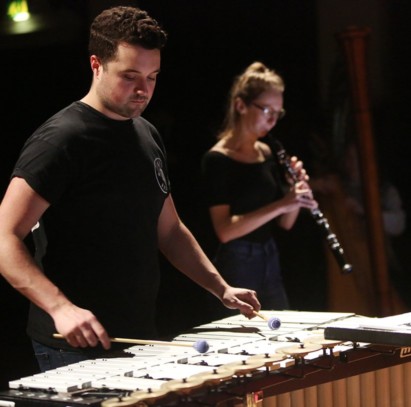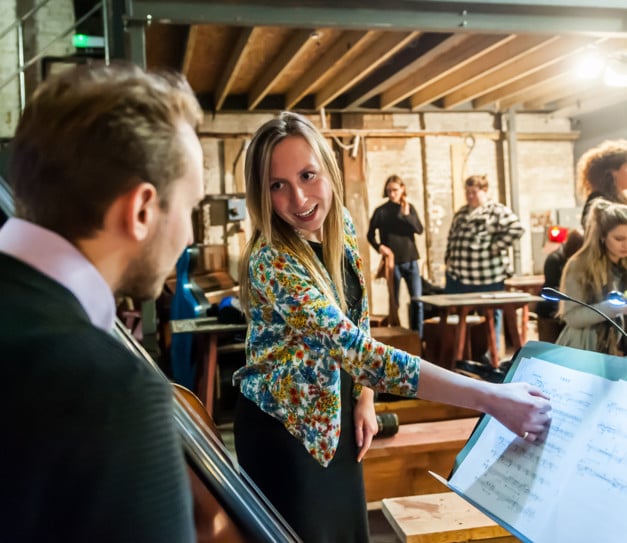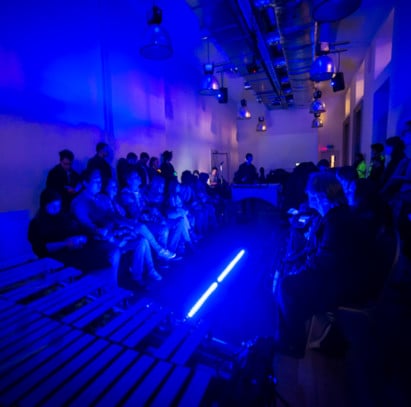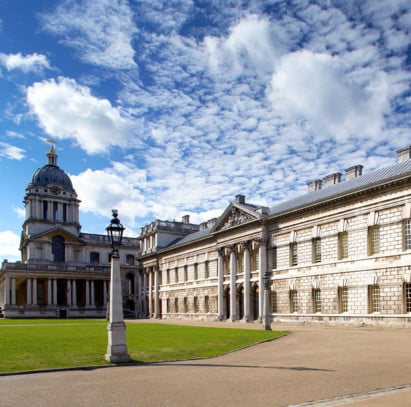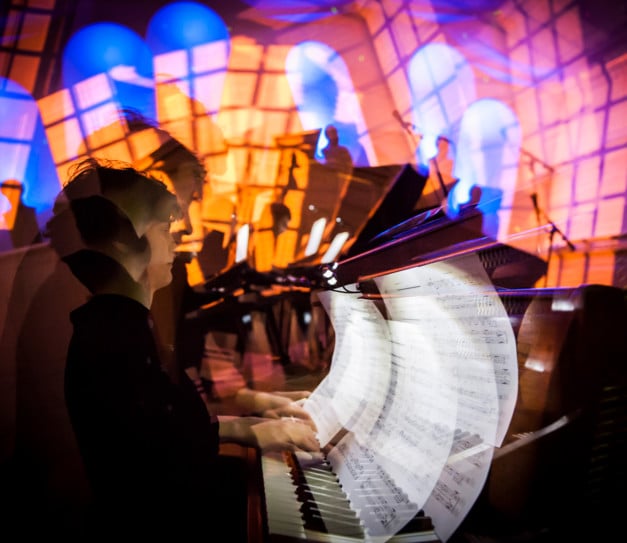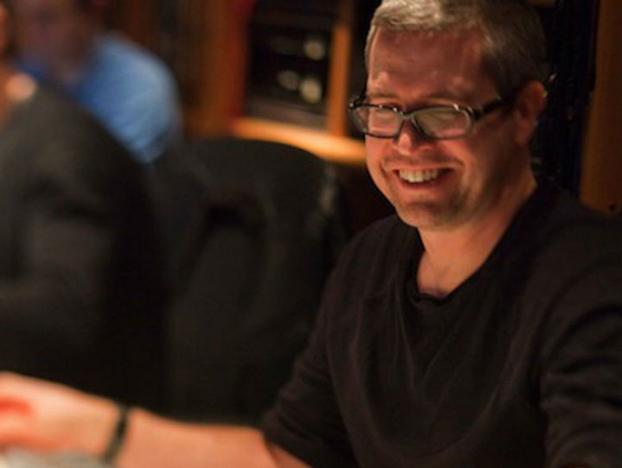
Introduction
Dynamic and adventurous, we provide a playground for the creative mind. If you have the ambition and potential to advance and transform 21st century music-making, you’ll thrive in our vibrant and experimental community. We welcome students with diverse musical backgrounds, and celebrate those prepared to challenge the boundaries of our art-form as we know it today.
You will develop sophisticated compositional techniques and become a superb orchestrator, understanding how the 20th and 21st centuries have drawn all available sounds into music and exploring where classical traditions meet contemporary rebellions. You will be asked to embrace the challenges of writing for the best professionals, fellow students, enthusiastic amateurs and your local community, whilst developing your skills in seeking commissions and meeting your audience’s needs and expectations.
Artistic success comes from a combination of hard work and experimentation. Our department is a community of experimenters, whom we encourage to have fun with the serious business of becoming a composer.
Teaching
With some of the UK’s leading composers amongst our faculty, you will join a team who look beyond music alone for their artistic influence and means of expression. They are highly experienced collaborators in dance, film, theatre, installation and other visual arts. In addition to individual and small group Principal Study lessons, you will undertake a range of Departmental classes which are specially designed to develop your technical skills and repertoire knowledge.
You are encouraged to continue your studies as an instrumentalist/ singer alongside your composition work, through additional Principal Study Enhancement one-to-one lessons.
We recognise the value of other art forms – that’s why the Department comes together every week for a session led by a guest artist, sometimes a contemporary composer, other times a chef, an author or even a mixologist!
Collaboration
Collaborative skills are central to our ethos, and you will have many opportunities to undertake project work, often in conjunction with external partners as well as with other musicians and dancers. You will be able to create projects with dance, theatre, film and more in concert halls, galleries, museums and clubs. There are no boundaries to the places you can take your art.
Facilities
Our composition department is located at the Faculty of Music within the stunning location of King Charles Court.
You will have access to a range of performance and practice facilities as well as:
- our dedicated Composition Suite and Keyboard Laboratory, which provides networked Mac workstations with full size weighted-action electronic pianos equipped with Logic Audio, Sibelius and Auralia software.
- Also available is the industry-standard Recording Studio, which is available for you to realise your acoustic and electro-acoustic works.
Performance
With a large body of some of today’s finest young performers at your disposal, you will write for individuals, chamber ensembles and larger performing groups, and hear your ideas in both workshop and performance contexts. Trinity Laban’s Contemporary Music Group is closely linked to the Department, and student commissions form a regular part of all our orchestral, choral and other ensembles’ concerts.
You are also encouraged to demonstrate your own creativity and initiative, for example through our regular ‘Rude Health’ concerts, which will give you the chance to showcase your work in evenings curated entirely by students.
A highlight of my time at Trinity Laban has been the frequency of how often my works have been performed and recorded. Every piece that I have written at Trinity Laban has been recorded, including two orchestra pieces.
James Layton, BMus Composition
Your Audition
We are encouraging applicants to audition in person where possible. However, if for whatever reason you are unable to attend a live audition in London online recorded auditions are available for all applicants.
In-person Auditions
Prior to audition, you must apply via UCAS Conservatoires. All auditions will be held in London at our Music Faculty between mid-November and mid-December. The address for the Music Faculty is: Trinity Laban Conservatoire of Music and Dance, King Charles Court, Old Royal Naval College, Greenwich, London SE10 9JF.
We will endeavour to schedule your audition as soon as possible and will update you with your audition date and time via UCAS Conservatoires and email. If you have any issues making this time, please let us know as soon as possible on the email on this page.
Audition Requirements
- All auditions will include a short discussion with the panel
- We do not have a dress code for auditions
- Where applicable an accompanist will be provided for you, you will have a rehearsal time of around 10 minutes with the accompanist prior to your audition. If you are bringing your own accompanist, let us know as soon as possible on the email below.
- If you have any accessibility requirements, please contact StudentServicesEnquiries@trinitylaban.ac.uk.
- Auditions do not include a written paper
- If you have also applied for BA Music Performance and Industry, details will be sent separately. You can find information on audition requirements and submission deadlines here.
Composition applicants use Embark to submit portfolios. Again, you can upload multiple files to create your portfolio of between 3 and 6 compositions. All styles are acceptable and unfinished works may be included. The portfolio must illustrate your ability to produce notated scores and recordings should be submitted where possible.
The deadline for portfolio submission is 27 October 2023.
Your portfolio will be assessed according to:
– Compositional techniques
– Writing for instruments/voice
– Analysis
– Harmonisation
The audition will take the form of a discussion of this portfolio. You will be asked to perform for 2-3 minutes on an instrument of your own choice in any style.
Recorded Auditions
Prior to submitting a recorded audition, you must apply via UCAS Conservatoires. Recordings will not be considered until a UCAS Conservatoires application has been submitted. When asked on UCAS Conservatoires where you wish to audition, simply click ‘recorded audition’ or ‘online’. You can watch our tutorial on submitting your UCAS Conservatoires application, for step-by-step instructions. Once you’ve submitted your application, our admissions team will be in touch with further information. Please keep an eye on your emails and check your spam inbox.
The deadline for submission of recorded audition materials is 27 October 2023.
Recording Your Audition
There should be two elements to your recording: a speech and a performance. You must submit a video recording of your speech and performance, and not only an audio recording. We do not require high production recordings, normally a recording on a phone or digital camera will suffice, but please check that the audio and video quality is clear before submitting your auditions.
We recommend sourcing a live accompanist if possible, however we can accept pre-recorded backing tracks and unaccompanied recordings. If you are playing with others, please make it clear who you are in the recording. There is no dress code for recorded auditions.
For the speech, you should record a passage of yourself speaking in English. For your speech you should:
- Introduce yourself by name
- Talk about your musical background and the training you’ve had
- Talk about your musical ambitions and your reasons for applying for the programme of study.
For the performance, please upload a video of you performing for 2-3 minutes on an instrument of your own choice in any style.
You may be invited to an online discussion with the panel via Zoom, you will be updated via email if this has been scheduled.
Composition applicants use Embark to submit portfolios. Again, you can upload multiple files to create your portfolio of between 3 and 6 compositions. All styles are acceptable and unfinished works may be included. The portfolio must illustrate your ability to produce notated scores and recordings should be submitted where possible.
Submitting Your Audition on Embark
You must submit your audition via Embark. To submit a recorded audition, you will first need to create an account before submitting your recordings or portfolio. For step-by-step guidance on submitting your recorded auditions, watch our Embark tutorial.
You can submit multiple files to Embark (i.e. your audition does not need to be submitted as one take). If you have any issues with uploading your files, you can also upload your files to a video sharing website (such as YouTube or Vimeo) and paste the links into a word or PDF document to upload into the Additional Documents section.
You do not need to submit materials for every section, e.g. you only need to submit Transcripts or Additional Documents if you would like the panel to see these.
There are no written papers for auditions.
Please note, if the performance on the recording is found not to be your own, the place will be withdrawn immediately and no fees will be refunded.
If you have any questions, please don’t hesitate to get in touch: admissions@trinitylaban.ac.uk
Graduates
Our graduates thrive in every corner of the composition world:
John Powell, Gavin Greenaway and John Ashton Thomas are acclaimed Hollywood composers, conductors and arrangers.
Ed Henderson and Tim Cape run experimental /underground events in London as the collective, Bastard Assignments.
Theo Jamieson and Oliver Payne are developing careers writing/directing musicals.
Jeff Wayne wrote The Musical Version of The War of the Worlds.
Laura Harrison is the Music Director at Soho Music.
Cassie Kinoshi was selected for The Old Vic Theatre’s year long professional development programme, the “Old Vic 12” for 2016/17. She was selected for LSO’s Panufnik Composers Scheme 2018 and was created Cameron Mackintosh Composer in Residence for 2019. She also performs and tours with her own ensemble, ‘Seed Ensemble’. As well as this, the all female band, ‘Nerija’, that she is part of, won Best Newcomer in the Parliamentary Jazz Awards 2017.
Cimeon Ellerton is Chief Operating Officer at The Audience Agency, which helps cultural organisations and policymakers plan and deliver audience strategies.
Soumik Datta is one of the world’s finest sarod players, collaborating with many different artists including Beyoncé and Anoushka Shankar.
Julian Hepple is a Grammy nominated sound engineer and music producer, working with artists such as Prince, One Direction and Andrew Lloyd Webber.
John K Miles composes for TV and film and leads on a huge variety of creative projects and workshops with different organisations.
Numerous others are creating work for concert hall, stage, film and TV, or work in engineering, programming, producing, arranging and directing.
To view the impressive organisations that our alumni have worked with, visit Alumni Destinations.
For more information on the successes of Trinity Laban Composition graduates and what they have to say about the course, visit Alumni Profiles.
-
News
Blackheath Halls celebrates remarkable venue transformation
Sir Bryn Terfel, the Blackheath Halls Youth Choir and TL Jazz students performed for HRH The Duke of Kent to celebrate the completion of Blackheath Halls’s remarkable renovation.Thu 25 April 2024 -
News
Trinity Laban Symphony Orchestra celebrates the work of Black British composers
This spring, Trinity Laban Symphony Orchestra performed works by Eleanor Alberga and Daniel Kidane, alongside Britten’s orchestral interludes from his best-known opera and a new work by one of TL's talented composition students.Mon 22 April 2024
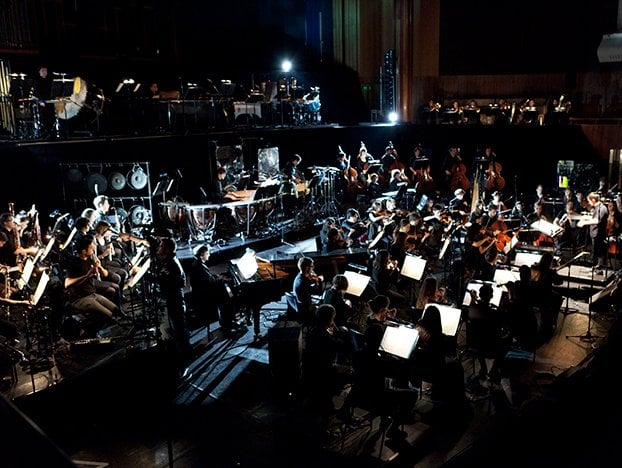
Composition at Trinity Laban
Dominic Murcott
Head of Composition and Music Technology
A cup of tea with...
Laura Jurd
Composition at Trinity Laban
Our community of experimenters are trained for the realities and diversity of professional life in the global village. Explore what studying Composition at Trinity Laban is like in our gallery.
- 1 - Parallax: Trinity Laban Contemporary Music Ensemble
- 2 - The Daryl Runswick Competition
- 3 - Rude Health: A Festival of New Music
- 4 - King Charles Court, Faculty of Music © Peter Smith
- 5 - Rude Health: A Festival of New Music

